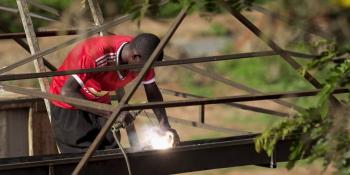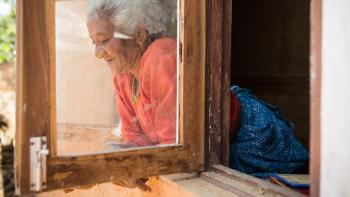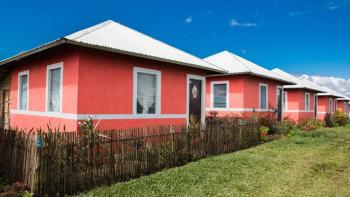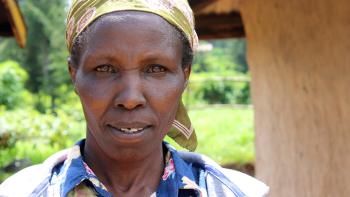Shelter solutions for people in sub-Saharan Africa
Building Assets, Unlocking Access
About 97 to 99 percent of people in sub-Saharan Africa do not have access to formal financing that will let them start building or improving a home.
Traditionally, people in Africa build incrementally, as their resources allow, so housing is a process, not a product. These families cannot afford a long-term, traditional mortgage. Instead they build in stages – creating a makeshift shelter and then eventually replacing it with permanent materials and expanding it. Small, short-term loans can fund the steps in this process with payments that are affordable for families with little money who want to improve their living situations.
About the partnership
In partnership with the Mastercard Foundation, Habitat for Humanity through its Terwilliger Center for Innovation in Shelter is providing technical assistance to six leading financial institutions in Uganda and Kenya to develop housing microfinance products and services to serve people living on less than US$5 per day. This initiative aims to target people who want to improve their housing conditions progressively. Through these financial institutions, families can access small, short-term loans with affordable payments that can fund their incremental building process.
Objectives
- Develop, validate and pilot scalable housing microfinance products at nine financial service providers across Ghana, Kenya and Uganda, and strengthen their institutional capacity to increase the potential of taking the housing microfinance product with housing support services to scale.
- Develop, validate and pilot scalable housing support services at nine financial service providers across Ghana, Kenya and Uganda.
- Demonstrate and document the impact of housing finance and housing support services on households and communities in areas such as health, education, greater base of assets and secure tenure; and on institutions’ performance through rigorous research.
- Disseminate practical knowledge on housing microfinance to other providers in Africa and for the broader industry, and influence the housing and finance industries.
The center is overseeing the project and providing institutional technical assistance to the financial institutions engaged in the project to develop or refine housing microfinance products with housing support services. This will be done by conducting market mappings of the housing and finance sector, market research, product design, pilot planning and implementation of housing microfinance products with housing support services. The center is also providing support to financial institutions to increase their capacity to take those products to scale and the dissemination of the lessons, as well as overseeing the impact evaluation of the project on the lives of households that have received housing microfinance products with housing support services throughout the life of the project.
Project impact
The partnership between Habitat for Humanity and the Mastercard Foundation is aimed at making an impact on housing in Africa by enabling existing financial service providers to design housing microfinance products and housing support services that can be accessed by low-income families to use in the incremental improvement of their homes. The objective of the project is to develop scalable and innovative housing microfinance products for both rural and urban clients with the potential to be replicated by other financial service providers in sub-Saharan Africa.
The project aimed to enable 15,000 households to access housing microfinance products and housing support services, improving their shelter, living conditions and social well-being throughout the five-year project.
Who were the clients in the Building Assets, Unlocking Access project?
As the project closes, we use project survey data to refresh our understanding of the participating housing microfinance borrowers, their housing situations and use of housing finance and the impact these loans have had on their quality of life.
Whom are we reaching? (.pdf)
See a snapshot of housing microfinance client trends and profiles.
KWFT Housing Microfinance Impact Evaluation Final Report (.pdf)
Building Assets, Unlocking Access: Centenary Bank Impact Evaluation Report (.pdf)
Progress to date
To date, the “Building Assets, Unlocking Access” project has helped more than 40,000 families in Uganda and Kenya access loans to secure adequate housing and so improve their living conditions. Furthermore, over $30 million in capital has been mobilized for the advancement of incremental housing microfinance loans across the two countries. Partner financial institutions participating of the project include Kenya Women Microfinance Bank Ltd., KCB, Stima SACCO in Kenya and Centenary Rural Development Bank Ltd., Opportunity Bank Ltd. and Pride Microfinance Ltd. in Uganda.
In early 2017, Kenya Women Microfinance Bank Ltd. and Centenary Rural Development Bank Ltd. visited MiBanco in Peru, one of the first partner financial institutions Habitat’s Terwilliger Center worked with to develop housing microfinance products. Later, in June 2017, representatives from Opportunity Bank Ltd., Pride Microfinance Ltd. and Centenary Rural Development Bank Ltd., from Uganda, visited Kenya Women Microfinance Bank in Kenya. These are peer exchange visits that happened as a result of the forum held by the Mastercard Foundation and Habitat’s Terwilliger Center for Innovation in Shelter in October 2015 in Naivasha, Kenya. The forum facilitated the exchange of lessons and knowledge to support the expansion of affordable housing in sub-Saharan Africa by bringing together financial and housing sector practitioners to learn from the experiences of financial institutions participating in the project in the addition and/or expansion of housing microfinance products and services.
A recent evaluation explored clients’ satisfaction with Nyumba Smart loans, along with the housing quality associated with the loans. To learn more about how these housing microfinance loans are being used, the resulting housing quality, the tools and housing support services that clients found most useful and opportunities for further improvement, read the summary of the evaluation findings (.pdf).
Learning resources
Read our learning resources on market opportunity for housing microfinance in sub-Saharan Africa.
Building the Business Case for Housing Microfinance: Sub-Saharan Africa
This publication looks at the demand for housing microfinance, its value proposition and the competitive advantage of differentiated housing microfinance products. It identifies factors key to the success and profitability of housing microfinance products, based on analysis of the work of Uganda’s Centenary Bank and Kenya Women Microfinance Bank.
- Building Assets, Unlocking Access: How Support Services Can Add to Housing Microfinance (.pdf)
This report examines what have we learned through the Building Assets, Unlocking Access project on how support services can add to housing microfinance. - Understanding the relationship between housing microfinance and land tenure in Uganda
- Why a branding and marketing strategy is key for uptake of housing microfinance products
- Learn about how artisan training initiatives complement housing microfinance delivery
- Maintaining a healthy portfolio through proactive loan delinquency management.
- How the “Building Assets, Unlocking Access” project works (.pdf)
- How housing microfinance is providing a comprehensive approach for financial institutions to support low-income families to improve their housing conditions (.pdf)
- The profile of potential clients of housing microfinance products based on market research findings as part of the “Building Assets, Unlocking Access” project (.pdf)
- A study on market opportunity and housing value chain in Kenya (.pdf)
- Exploring the market opportunity for housing and property microinsurance in Kenya (.pdf)
- Impact of Ghana’s economic slowdown on Habitat’s “Building Assets, Unlocking Access” project (.pdf)
For more information on this project please contact tcis@habitat.org.



